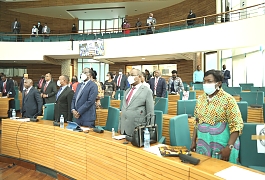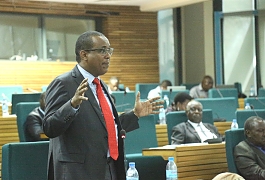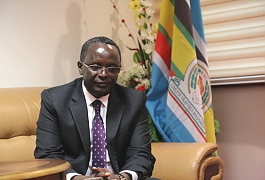Matters of Governance and the post 2015 Development Agenda shall come into scrutiny mid- this week at a high-level African Thematic Consultation taking place in Midrand - Johannesburg, South Africa. The Consultation organised by the Pan-African Parliament (PAP) takes place on February 26-27, 2013. Prof Amos Sawyer, the Chair of the African Peer Review Mechanism (APRM) and former President of Liberia, is expected to open the two-day Consultation.
In attendance are key African leaders and eminent personalities. Among the leaders are former Presidents, H.E. Festus Mogae of Botswana, H.E. Thabo Mbeki of South Africa, Ghana’s Jerry John Rawlings and H.E. Joachim Chissano of Mozambique. Others are Republic of Mozambique’s Prime Minister, Rt. Hon Alberto Vaquina and his counterpart from the Kingdom of Lesotho, Rt. Hon Motsoahe Thomas Thabane. The Secretaries General of the SADC, COMESA and the President of the Pan-African Lawyers Union (PALU) are also expected to be in attendance.
High ranking government officials from the EAC Partner States and the continent have also been invited. The aim of the meeting is to bring together the African experience on governance so that this may inform the new global development agenda.
Various related topics shall be discussed. The topics shall delve into the state of democratic governance as envisaged by the African Union, roles of various stakeholders including Parliamentarians, academia and civil society in the development agenda and financing sustainable development – post 2015.
The EALA Speaker, Rt. Hon (Dr) Margaret Nantongo Zziwa shall be on a panel sharing reflections on the role of Parliamentarians, Media and Civil Society in enhancing participation by citizens in democratic governance processes.
The consultation takes place two years before the period set for the globe to have realized the UN backed Millennium Development Goals (MDGs) expires. Resulting from a series of UN Summits in the 1990s, MDGs were identified as key in global co-operation for development. Since these international goals and associated landscapes were set in 2000, the development landscape of the world has shifted. Analysts note that any new development agenda must reflect on the new trends while building on the positive achievements of the MDGs.
The meeting is to be preceded by a (pre-event) thematic meeting on governance which shall elicit views from a broad range of African stakeholders such as Parliamentarians, media, civil society, community based groups, faith based organisations, intellectuals, youth and the women groups.
NOTES TO THE EDITORS
The Pan-African Parliament
The Pan-African Parliament (PAP) was established in March 2004, by Article 17 of the Constitutive Act of the African Union, as one of the nine Organs provided for in the Treaty Establishing the African Economic Community signed in Abuja, Nigeria, in 1991.
The establishment of the PAP is informed by a vision to provide a common platform for African peoples and their grass-roots organizations to be more involved in discussions and decision-making on the problems and challenges facing the continent.
The seat of the Parliament is in Midrand, South Africa. The PAP represents all the peoples of Africa. The ultimate aim of the PAP is to evolve into an institution with full legislative powers, whose members are elected by universal adult suffrage.
The objectives of the Pan-African Parliament are to:
• facilitate the effective implementation of the policies and objectives of the OAU/AEC and, ultimately, of the African Union;
• promote the principles of human rights and democracy in Africa;
• encourage good governance, transparency and accountability in Member States;
• familiarize the peoples of Africa with the objectives and policies aimed at integrating the African continent within the framework of the establishment of the African Union;
• promote peace, security and stability;
• contribute to a more prosperous future for the people of Africa by promoting collective self-reliance and economic recovery;
• facilitate co-operation and development in Africa
• strengthen Continental solidarity and build a sense of common destiny among the peoples of Africa;
• facilitate co-operation among Regional Economic Communities and their Parliamentary fora.
-End-
For More Information, contact:
Bobi Odiko, Senior Public Relations Officer;
East African Legislative Assembly;
Tel: +255-27-2508240 Cell: +255 787 870945, +254-733-718036;
Current Number. in South Africa + 27 (0) 722894041
Email: bodiko@eachq.org
Web: https://www.eala.org
Arusha, Tanzania



